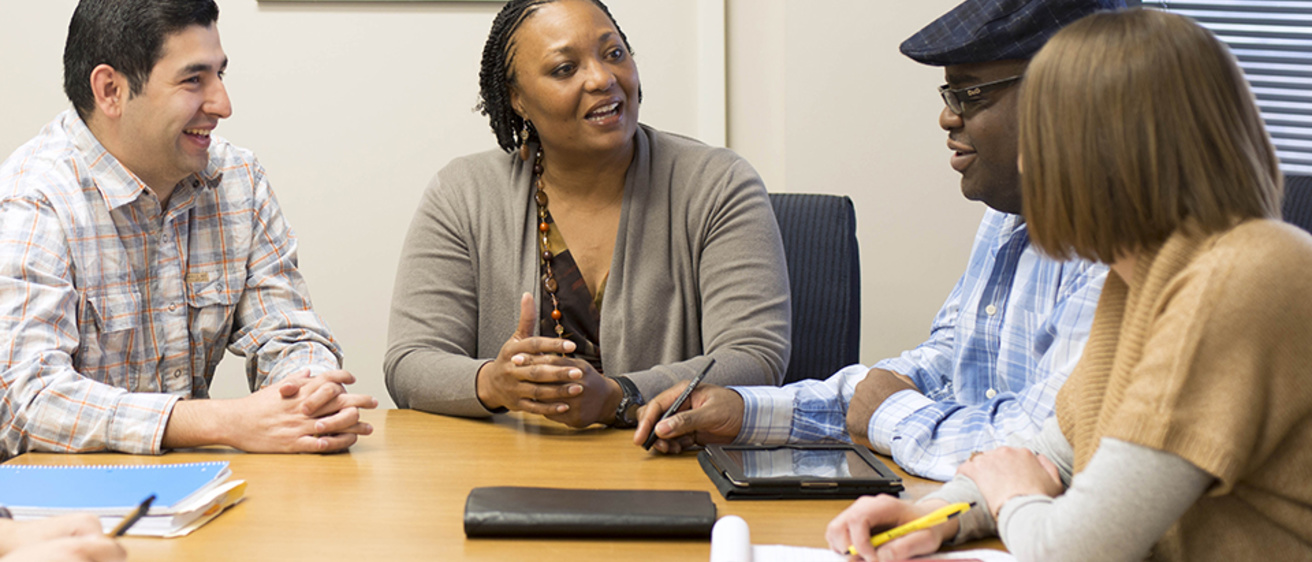Sherry Watt worries about her own nephew-son—whom she started raising when he was 10 months old, after the unexpected death of Watt's sister—as she listens to news stories about deadly confrontations between young black men and law enforcement or armed citizens.
Watt talks with him about what it means to be black, how he needs to be aware that he may be perceived stereotypically by others, and to not be defined through other’s distorted understandings of race.
Watt, an associate professor of higher education and student affairs in the University of Iowa College of Education, says she’s had her share of difficult conversations in her life, whether professionally or personally.
Her research interests range from studying identity development and multicultural initiatives to cultural competence, effective student-affairs practices, and cultivating productive dialogue on difficult topics, such as race and other social issues.
Though Watt has a Ph.D. in counselor education, she also has a lot of lived experience as an African-American woman, a single parent, and a two-time breast cancer survivor.
Her professional and personal experiences combine to provide a powerful platform from which Watt can share her insights and educate others.
Watt was recently selected as the UI Chief Diversity Office’s inaugural faculty fellow, a cornerstone of the university’s diversity and inclusion efforts. In that role, Watt is working closely with the CDO and other senior leaders on a variety of diversity initiatives.
Iowa Now recently caught up with Watt to learn more about her new role and the important work being done on campus and in the community.
What do you do in this role?
I use my research and facilitation expertise to teach people how to work across difference. This is an exciting way to bring theory to practice and to make a positive impact on both campus and the broader community by engaging people beyond the traditional classroom.
For the first phase of the fellowship, I am developing a curriculum for a session of the BUILD (Building University of Iowa Leadership for Diversity) program, a non-credit–bearing certificate program for faculty and staff who want to gain skills to contribute to the creation of a campus climate that supports safety and success for everyone.
I am working with the UI Center for Diversity and Enrichment to develop a training program for the GEAR UP grant, which is a statewide K–12 initiative. The trainings will help participants develop personal skills to engage responsibly across difference, including race, culture, and socioeconomic status. We’re hoping to help people identify and understand the social barriers, such as racism, sexism, and heterosexism, that prevent people from having access to resources to improve their lives.
I am also working with the College of Education to lead a series of meaningful dialogues aimed at addressing diversity issues college-wide.
Who will be the primary audiences for many of the initiatives and programs you are developing?
The primary audiences for this phase of the fellowship are the GEAR UP K–12 teachers and school counselors, as well as campus leaders, including faculty, staff, students, and administrators.
Tell us a little bit about your research expertise in these areas.
I primarily study privileged identity through the lens of participant reactions to difficult dialogues. The Privileged Identity Exploration (PIE) Model that I developed describes eight defensive reactions individuals often display when engaged in difficult dialogues.
This is a model that describes reactions from people with privileged identities—for example, being white, heterosexual, Christian, or male. I look at how people with privileged identities respond when their identities are challenged, and generally the first reaction is a defensive reaction.
How you will use your research to help the campus and community?
I will consult with campus leaders to help strengthen strategies already being used in classrooms and community discussions to explore controversial societal problems, such as racism, homophobia/heterosexism, and xenophobia.
This gives people some micro-skills, which are smaller, subtle interpersonal skills that support them in having productive conversations with someone who has a completely different perspective. An example of a micro-skill is recognizing what underlies your reaction to someone who is different and exploring your response in more consciously-aware ways without trying to alter, demean, or degrade them.
In addition to teaching and conducting research, what other ways do you educate and inspire change?
In light of the recent, highly publicized racial incidents such as Ferguson, Missouri, and the University of Missouri protests, my national reputation has been extended beyond the realm of higher education and into that of a public scholar by writing and publishing guest columns. In this role, I apply my research to specifically address aspects of race and racism as it is being played out in society today.
A recent article I wrote—one of several—appeared on the website for Krista Tippett’s On Being—where I advocate treating racism as we would treat a disease.
Writing these columns is an essential aspect of my scholarly practice. I write to make sense of the world and hopefully to make a difference, particularly as it relates to the current and chronic state of unrest in our society with regard to racial issues.
What impact do you see your role having on campus and in the community?
I personally hope to translate my research and facilitation expertise to serve the campus, the College of Education, the Iowa City community, the larger higher education community, and our society. It is my aim to work with the Chief Diversity Office to make UI a leading example for other campus communities that want to engage meaningfully across difference.
What are you most looking forward to in this new role?
I am excited for this opportunity and the potential it has for transforming diversity efforts on our campus. I’d like to see our campus continue the important steps being taken by the Chief Diversity Office to make fundamental changes. I am honored to contribute my expertise and skills to enhance the university culture.
